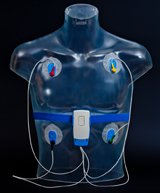Versatile ECG – Fraunhofer IPMS granted medical license for long-term ECG recorder
Nearly everyone nowadays has an electrocardiography, or ECG for short, at some point in time. It doesn't matter if the doctor suspects cardiac arrhythmia, myocarditis or a heart attack, whenever the heart's health is at stake the reading, recording and analysis of the electrocardiogram is the most important examination method to obtain indications of coronary diseases. Patients typically consult their doctor or remain in hospital under observation for a longer period of time after an operation. But this is not always necessary, or so say scientists from the Fraunhofer Institute for Photonic Microsystems IPMS in Dresden. The researchers have developed a comfortable ECG recorder that reads and analyses long-term ECGs at home in everyday conditions and then transmits the results to the doctor in real-time by radio. The device, which has now been granted a medical license, will be presented to the public at the Arab Health in Dubai from January 27 - 30, 2014.
During an ECG the doctor only sees the temporal course of the electrical stimulation of the heart. In order to be able to draw conclusions about the function of the organ and thus find indications of possible coronary diseases he has to interpret the resulting pattern of the changes in tension of the heart. Important criteria here are the peaks and troughs of the stress amplitudes, their steepness and duration as well as the temporal gaps between these. Since complaints or certain events – for example sports – can affect the result of the examination, doctors prefer to read resting or exercise ECGs under controlled conditions. However, in the case of sporadic symptoms, for example cardiac arrhythmia, that only occur temporarily and are thus not always recorded in an ECG, or phenomena that occur under special conditions in daily life, or patients who want to return home as quickly as possible after a longer stay in hospital, but who still want to feel safe, the electrocardiogram has to be recorded continuously over 24 hours or longer.
Scientists at the Fraunhofer IPMS have developed a 3-channel ECG recorder called SmartVital for precisely these fields of application. SmartVital is small, light and easy to use. But above all, the devices offer a real-time analysis of the ECG signals based on various methods such as the rhythm analysis, QRS classification, an analysis of the auricular activity, changes in the ST-segments (ischemiae) and QT measurement. If the evaluation software identifies an abnormality in the ECG, the recorder sends an ECG section to the doctor via a gateway, who can then decide on any further steps. This does away with a visit to the doctor that would otherwise be necessary. The quality of the readings is also increased by recording and analyzing the patient's movements and thus their physical activity during the measurement. SmartVital combines movement information with the ECG data so that any changes to the ECG can be assigned to the relevant physical stress situation and disturbances due to motion artifacts can be clearly identified. The device, which is equipped with a motion sensor for this purpose, automatically detects whether the patient is standing up, lying down, walking, running or climbing stairs. For example, a pathological tachycardia is not presumed if the patient climbs some stairs and the heart rate increases, because this is normal in this stress situation. Another advantage: the ECG is recorded under everyday stress without the patient having to keep records about their daily routine.
Fraunhofer IPMS will be presenting SmartVital at the Arab Health in Dubai from January 27 - 30, 2014 as part of an overall system that measures not only the ECG but also other important vital parameters such as blood pressure, weight or blood sugar analogous to the ECG in a domestic environment and provides these for the doctor in charge on an Internet portal. A small base computer (gateway) is hereby installed in the home that establishes wireless communication with the measuring devices via a Bluetooth interface. SmartVital was awarded a medical license in 2013. Visitors to the Arab Health will find the Fraunhofer IPMS exhibition in the German Pavilion in the Zabel Hall on Booth 37.
 Fraunhofer Institute for Photonic Microsystems
Fraunhofer Institute for Photonic Microsystems